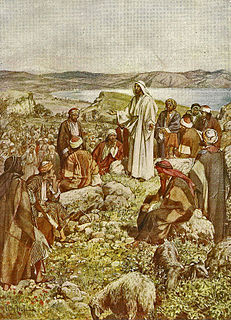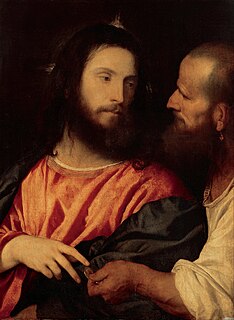Related Research Articles

Mark 12 is the twelfth chapter of the Gospel of Mark in the New Testament of the Christian Bible. It continues Jesus' teaching in Jerusalem during his third visit to the Temple, it contains the parable of the Wicked Husbandmen, Jesus' argument with the Pharisees and Herodians over paying taxes to Caesar, and the debate with the Sadducees about the nature of people who will be resurrected at the end of time. It also contains Jesus' greatest commandment, his discussion of the messiah's relationship to King David, condemnation of the teachers of the law, and his praise of a poor widow's offering.

Matthew 3 is the third chapter of the Gospel of Matthew in the New Testament. It is the first chapter dealing with the ministry of Jesus with events taking place some three decades after the close of the infancy narrative related in the previous two chapters. The focus of this chapter is on the preaching of John the Baptist and the Baptism of Jesus.

Matthew 5:20 is the twentieth verse of the fifth chapter of the Gospel of Matthew in the New Testament and is part of the Sermon on the Mount. Jesus has reported that he came not to destroy the law, but fulfill it. But in this verse, he makes clear that the common understanding of the Law is not enough.

Matthew 5:33 is the thirty-third verse of the fifth chapter of the Gospel of Matthew in the New Testament and is part of the Sermon on the Mount. This verse is the opening of the fourth antithesis, beginning the discussion of oaths.

Mark 3 is the third chapter of the Gospel of Mark in the New Testament of the Christian Bible. It relates a conflict over healing on the Sabbath, the commissioning of the Twelve Apostles, a conflict with scribes and a meeting of Jesus with his own family.

Mark 10 is the tenth chapter of the Gospel of Mark in the New Testament of the Christian Bible.

The Parable of the Wicked Husbandmen, also known as the Parable of the Bad Tenants, is a parable of Jesus found in the Gospel of Matthew, the Gospel of Mark and the Gospel of Luke. It is also found in the non-canonical Gospel of Thomas. It describes a householder planting a vineyard and letting it out to husbandmen who failed in their duties.

Mark 13 is the thirteenth chapter of the Gospel of Mark in the New Testament of the Christian Bible. It contains Jesus' predictions of the destruction of the Temple in Jerusalem and disaster for Judea, as well as his eschatological discourse.
Matthew 16 is the sixteenth chapter in the Gospel of Matthew in the New Testament section of the Christian Bible. Jesus begins a journey to Jerusalem from the vicinity of Caesarea Philippi, near the southwestern base of Mount Hermon. Verse 24 speaks of his disciples "following him".

Luke 17 is the seventeenth chapter of the Gospel of Luke in the New Testament of the Christian Bible. It records the teachings of Jesus Christ and the healing of ten lepers. The book containing this chapter is anonymous, but early Christian tradition uniformly affirmed that Luke composed this Gospel as well as the Acts of the Apostles.

"Render unto Caesar" is the beginning of a phrase attributed to Jesus in the synoptic gospels, which reads in full, "Render unto Caesar the things that are Caesar's, and unto God the things that are God's".

Matthew 7:22 is the twenty-second verse of the seventh chapter of the Gospel of Matthew in the New Testament and is part of the Sermon on the Mount. This verse continues Jesus' warning against false prophets.
Matthew 9:14 is a verse in the ninth chapter of the Gospel of Matthew in the New Testament.
Matthew 9:18 is a verse in the ninth chapter of the Gospel of Matthew in the New Testament.
Matthew 9:34 is a verse in the ninth chapter of the Gospel of Matthew in the New Testament.
Matthew 11:25 is a verse in the eleventh chapter of the Gospel of Matthew in the New Testament.
Matthew 12:26 is a verse in the eleventh chapter of the Gospel of Matthew in the New Testament.
Matthew 12:28 is a verse in the eleventh chapter of the Gospel of Matthew in the New Testament.
Matthew 11:4-6 is a set of verses in the eleventh chapter of the Gospel of Matthew in the New Testament.
Matthew 12:31-32 are two verses in the eleventh chapter of the Gospel of Matthew in the New Testament.
References
- ↑ John MacEvilly, An Exposition of the Gospel of St. John consisting of an analysis of each chapter and of a Commentary critical, exegetical, doctrinal and moral, Dublin Gill & Son 1879.
- 1 2 3 4 "Catena aurea: commentary on the four Gospels, collected out of the works of the Fathers: Volume 6, St. John. Oxford: Parker, 1874. Thomas Aquinas".
 This article incorporates text from this source, which is in the public domain.
This article incorporates text from this source, which is in the public domain.